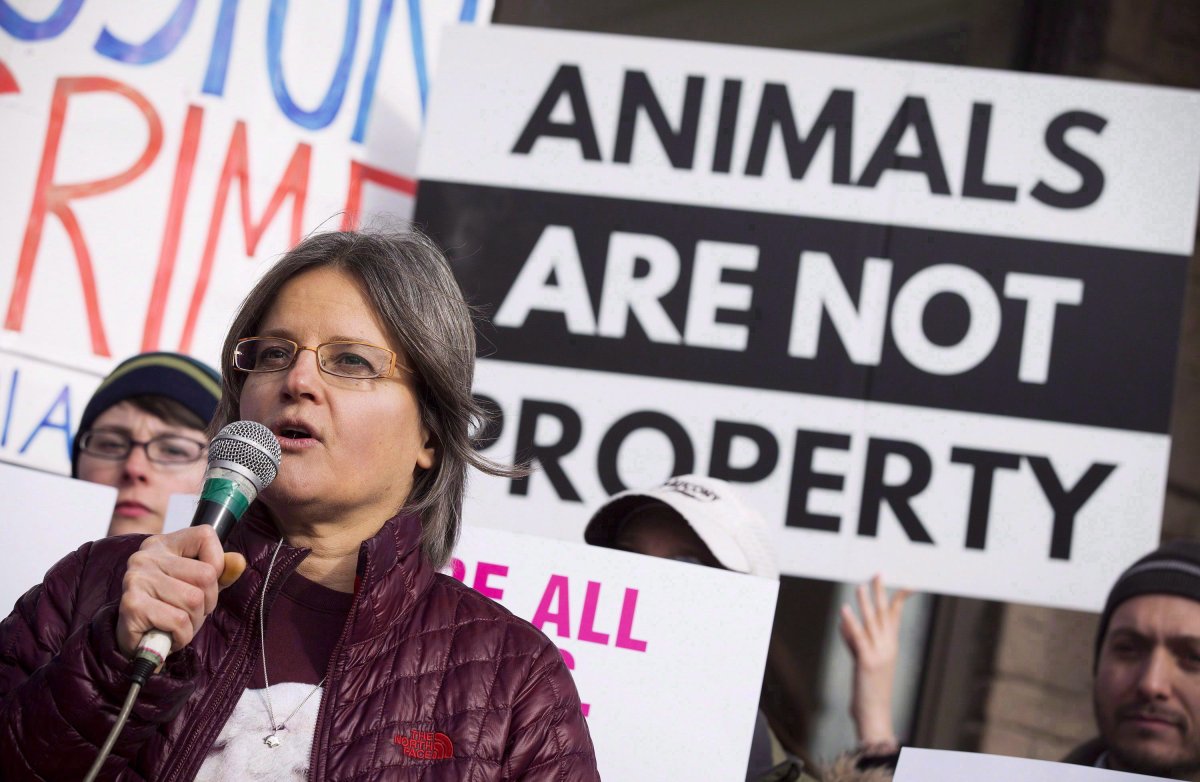A regularly scheduled vigil at a Burlington slaughterhouse had added meaning on Wednesday as activists mourned the implementation of portions of an Ontario bill that protects the local livestock industry from anti-meat activists.

A group from Toronto Pig Save referred to the Ford government’s new “ag-gag” law as “evil” during their weekly vigil in front of the Sofina-Fearmans plant in Burlington.
Toronto animal advocate Anita Kranjc told Global News there was little in the way of confrontations between Halton police and counter-protesters at the processing facility.
“They had senior officers out there and there were also four counter-protesters there,” said Toronto animal advocate Anita Kranjc.
“But we continued to do what we wanted to do, which is bear witness to the animals.”
The Food Supply Protection Act (Bill 156), which received royal assent in mid-June, came into force this week and generally limits interactions between the public and any element of the food supply business including farm animals, truckers and farmers.
The new act is the work of Agriculture Minister Ernie Hardeman who proposed the law in 2019, arguing it would eliminate the “risk of introducing contaminants into the food supply chain” and protect “the safety of drivers of motor vehicles.”
Lynn Kavanagh from World Animal Protection in Canada fears the bill will silence a number of whistleblowers from attempting to “reveal the reality” about the living conditions for farm animals.
“Without people bringing awareness to this, the truth remains hidden as there are no mandatory laws protecting animals on farms,” Kavanagh told Global News on Wednesday.
The bill proposes penalties of up to $15,000 for a first offence and $25,000 for subsequent offences tied to trespassing or obstructing vehicles carrying farm animals.
Ontario opened up public comments on Monday for the “shape and content” of proposed regulations under the law and will accept feedback until Oct. 15.
The law came after some high-profile incidents in recent years headlined by Krajnc‘s effort in 2015 to give water to pigs on a truck taking them to slaughter at a pork processing plant in Burlington.
Animal rights groups, such as Toronto Pig Save, Animal Save Movement and Animal Rebellion, have been vocal about the bill, having launched petitions and websites opposing the legislation in the past year.
Samuel Trosow, an associate professor of law at the University of Western Ontario, told Global News in August that the bill will face a number of legal challenges due to “constitutional problems” in the way it was written.
Trosow says he believes that, as drafted, the provision violates section 2(b) of the Canadian Charter of Rights and Freedoms which protects everyone’s freedom of expression and freedom of the press.
“It makes it much harder and much riskier for activists, investigative journalists or even employees who are just working there to report bad conditions,” Trosow said.
He said the legislation appears to be “unnecessary” since the province already has laws that prohibit trespassing on private property.
- ‘Shock and disbelief’ after Manitoba school trustee’s Indigenous comments
- Canadian man dies during Texas Ironman event. His widow wants answers as to why
- Several baby products have been recalled by Health Canada. Here’s the list
- ‘Sciatica was gone’: hospital performs robot-assisted spinal surgery in Canadian first
“If the problem is lack of enforcement of the existing Trespass to Property Act, as several opponents have suggested, that could be addressed without the need for legislative amendments,” Trosow said.
However, Halton Regional police disputes a connection to the trespass act, saying the new law “differs” in that “enforcement is not confined to private property in dealing with vehicles in operation.”
“We recognize the right for people to protest, but that right does not include dangerously obstructing vehicles at food processing facilities,” chief Stephen Tanner said in a statement on Monday.
“While there may be an opportunity for a graduated educational approach in the early stages of this new legislation, enforcement will be utilized as soon as necessary.”
In mid-June Hamilton activist Regan Russell died in front of the Burlington processing plant when she was hit by a transport truck near Harvester Road and Appleby Line.
The driver, a 28-year-old man from the area of North Perth, faces a charge of careless driving causing death.
The vice-president of Brussels Transport Ltd., whose truck was involved in the fatal accident, says the recent ordeal has been challenging with drivers being “verbally and physically harassed” with police “not doing anything about it.”
Tyler Jutzi says he’s hoping the legislation will provide some relief for his drivers but admits he’s skeptical.
“We hope it’s the answer and that is going to get rid of this very unsafe situation down there,” Jutzi said. “We hope Bill 156 will finally have the cops do their jobs.”






Comments